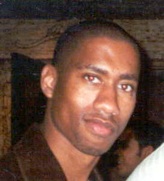Damion Thomas
Damion Thomas (Ph.D., University of California-Los Angeles) is an Assistant Professor of Physical Cultural Studies in the Department of Kinesiology, and affiliate faculty in the African American Studies Department. His research interests include: Sport and United States race relations, Black internationalism, African American popular culture, U.S. foreign relations, and Black masculinity.
Dr. Thomas teaches the following courses:
-
•KNES 293: History of Sport in America (3 credits)
-
•KNES 498D: Black Masculinity and Basketball (3 credits)
-
•KNES 498K: Sport and the Civil Rights Movement (3 credits)
-
•KNES 689Q:Critical Race Studies and Physical Culture Sport (3 credits)
His book, Globetrotting: African American Athletes and Cold War Politics, provides a transnational perspective to the study of domestic American racial affairs by examining U.S. government attempts to manipulate international perceptions of U.S. race relations during the early days of the Cold War. As nations in Africa, Asia, and Latin American gained their independence, State Department officials realized that international condemnation of U.S. domestic racial violence was the biggest hindrance to U.S. Cold War foreign policy objectives. Consequently, the State Department began to send prosperous African Americans overseas to showcase African Americans as the preeminent citizens of the African Diaspora, rather than as victims of racial oppression. Because sports were, arguably, the most publicly visible American institutions to integrate, athletes were prominently featured in the State Department goodwill tours. These tours were designed to undermine anti-Americanism as a foundation for racial and political identity formation throughout the African Diaspora. However, as African-American athletes began to provide counter narratives to State Department claims about American exceptionalism—most notably during the 1968 Mexico City Olympic protest—the transatlantic relationships these tours fostered were co-opted as a means to foster African Diasporic cultural and political agendas.
Additionally, his recent publications include articles in the International Journal of the History of Sport, Sport & Society, and the Journal of Sport & Social Issues. Additionally, he has contributed book chapters to the following collections: Out of the Shadows: A Biographical History of African American Athletes and East Plays West: Sport and Cold War.

